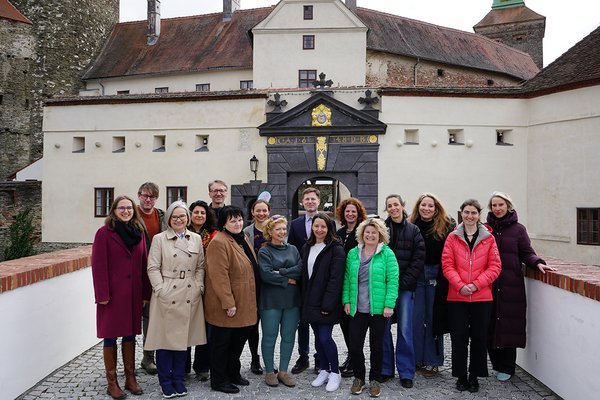About Us
The Austrian Centre for Peace (ACP) has been showing ways to peace for over 40 years. It offers a neutral platform for dialogue and mediation, whether at the Peace Castle in Stadtschlaining, its second location in Vienna, or worldwide. The ACP capacity development programmes prepare experts for conflict-sensitive work in crisis regions. Research at the ACP provides the basis. Peace education sensitises the younger generations of our society. The ACP has i.a. been awarded the United Nations title „Peace Messenger“ and the UNESCO „Peace Education Prize“ for its work.
The Austrian Centre for Peace (ACP) was founded in 1982 and is organised as a non-profit, independent, non-partisan association. It consists of the following bodies: General Assembly, Board, Management, Scientific Advisory Board, Auditors and Court of Arbitration. The rights and duties of the members of the respective bodies are set forth in the ACP constitution.
The ACP focuses its work on capacity development, conflict resolution and research.
In terms of capacity development, the ACP focuses on two core areas: the training of peacebuilding experts who are or will be deployed in crisis regions and peace education for schools in Austria. Hundreds of civilian, military or police experts are trained as part of the various training programmes worldwide or in Austria. In this area, the ACP cooperates with the EU, UN and OSCE. The effects of environmental degradation and the climate crisis are an integral part of many training programmes. The use of new technology as a tool for peacebuilding, known as „PeaceTech“, is also playing an increasingly important role. ACP‘s training work in West Africa focusses in particular on humanitarian assistance and disaster relief. The ACP develops and offers customised training courses on request.
Every year, more than 1 000 pupils take part in the ACP‘s peace education programmes on conflict and peace skills, non-violent communication, bullying and violence prevention, respectful behaviour, integration and diversity, as well as team building and solidarity. In parallel, systemic skills training is offered for teachers. Moreover, the ACP cooperated with the University College of Teacher Education in developing the Master‘s programme “Peace and Life Skills Education“.
In the past, Austrian stakeholders have made important contributions to international peace policy as valued mediators in conflicts. Against the backdrop of an increasingly conflictridden world, this potential needs to be fully utilised again. For mediation to actually contribute to peace, recognised principles such as impartiality, consent of the relevant parties, inclusivity and the principle of doing no harm through one‘s own actions must be upheld. Peace can only be made with enemies. A peace process must therefore include the parties who exert influence on the conflict. The ACP supports official negotiations and informal dialogue processes, mediating directly between the parties to a conflict. Initiatives take place at the local, regional and national levels and in a dialogue with formal and informal armed actors, political interest groups and civil society. These activities form the core mission of the ACP.
At international level, the ACP‘s peacebuilding activities have focussed on the Middle East, Africa and the OSCE region for many years.
Many conflict-ridden countries in Europe‘s immediate neighbourhood are exceptionally hard hit by the climate crisis, but also particularly ill-equipped to deal with its effects. This further exacerbates or creates new conflict dynamics. The ACP is therefore vigorously pursuing climate change adaptation programmes combined with conflict prevention approaches, particularly in the form of environmental peacebuilding.
In Austria, we specialise in the design and management of conflict resolution within communities, which is intended to contribute to peaceful coexistence.
The ACP contributes to the dialogue on current peace policy issues through research, specialist conferences and publications. Such research also forms the basis for policy advice from the ACP. Likewise, research is an important companion to conflict management. On the one hand, it enables to identify significant trends, and on the other, it helps to better understand complicated dynamics in specific conflict areas and thus to propose more realistic solutions to the conflict parties. ACP publications include policy briefs and reports.
After a millennium full of blood and terror - when will mankind's old dream of eternal peace finally come true? The change of basic attitudes, the constant (scientific) work on the causes of conflicts and wars and the dissemination of a credible message of peace to the broadest sections of the population - that is what the ACP can do convincingly.
Erwin Schranz, former President of the Landtag in Burgenland

